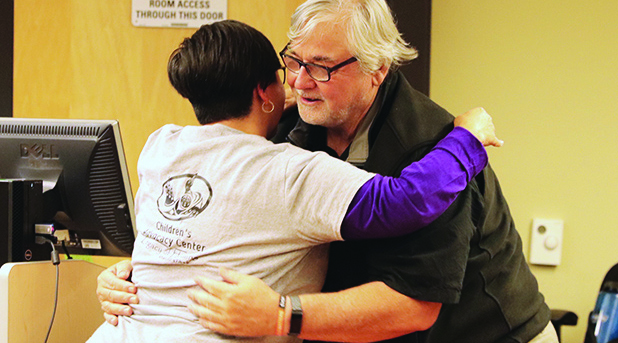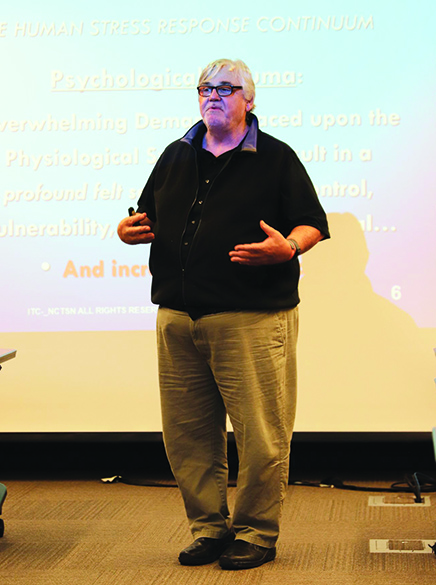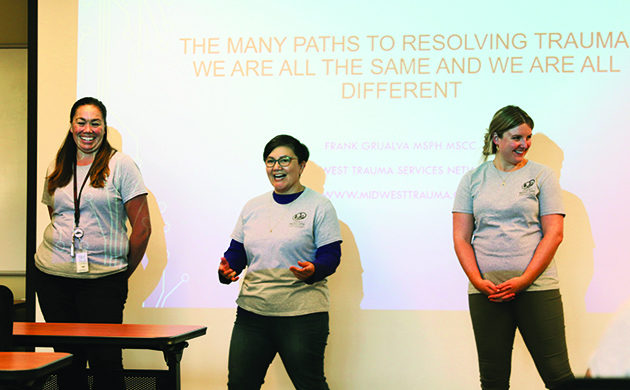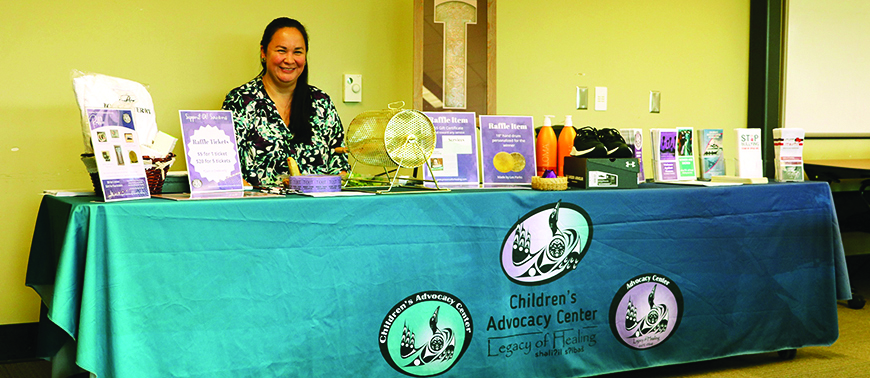
By Kalvin Valdillez, Tulalip News
Recently, the Tulalip Tribes held the second annual community gathering in recognition of National Residential Boarding School Awareness Day. This year, the event brought out hundreds of tribal members and community members in an effort to bring attention to the truth about the terrible actions that occurred during the boarding school era. And equally important, the gathering presents an opportunity to start the healing process from that trauma, which has been passed down through the generations.
Now that many are beginning to understand what generational trauma is and how it affects Native America, as well as themselves personally, they want to take action. There has been a concentrated effort amongst tribal nations to identify what their people’s traumas are and how to address it now, so our future tribal leaders do not have to live through the number of struggles that came before them.

Generational trauma affects not only the community, but the individual homes of each tribal member as well. Our habits, behaviors, decision making abilities and trigger responses are all results of our trauma, as is our physical and spiritual well-being. As Native people, our trauma might look like substance abuse, depression, suicide. Trauma does not only affect the individual, but also the people they are surrounded by, such as their children, spouses, and their extended family, and community. And although not always, trauma can often lead to domestic violence (DV) situations inside the household.
Tackling the issue head-on, following the healing experience from the September 30th community gathering, the Legacy of Healing (LOH) hosted a two-and-a-half-hour workshop on October 6th at the Tulalip Administration Building. The workshop was focused on resolving trauma and served as the kick-off event for National Domestic Violence Awareness Month, and approximately twenty community members took part in LOH’s first event of the month.
“The traumas that we experience are a direct link to the domestic violence that people also experience in their lives,” said LOH Director, Jade Carela. “I believe that a lot of it stems from the trauma that we’ve had in our lives and the things that we learned growing up.”
The informative and insightful workshop was led by the Director/Consultant of the Midwest Trauma Services Network, Frank Grijalva MSCC, MSPH. Frank has been in the Tulalip and Marysville community for several years and has worked with the Tribe’s education division, the community health department, and also the Marysville School District.
Frank’s presentation gave an in-depth look at what trauma is and how it rewires our brains and central nervous systems. He spoke about how trauma plays a role in the early childhood development stages and how some traumas are passed along before the birthing process. Throughout the workshop, he took plenty of time to pause to see if the people were following along and if there were any highlights or topics they could relate to in their own homes and families.

Frank said, “What we did in the boarding schools three generations ago, is we fractured all the families. So, auntie wasn’t there to pick up the baby when the baby was too much for the mom. Or sissy, cousin, grandma, or whoever wasn’t there to take over, to pass the baton to, so their mom could get some rest. Everywhere I go, it’s grandparents who are taking care of the kids because so many kids in this generation have lost themselves, lost their ability to attach and stay in rhythm and be vulnerable, and to stay in love and stay connected.”
After taking time to discuss what trauma is, and what it looks like at Tulalip, Frank explained that people can begin the work of healing their trauma wounds, and over time they can rewire their brains and central nervous systems, essentially becoming an entirely new person with a new outlook on life.
“Indigenous practice knows more about what it’s doing than the colonized practice,” he stated. “Colonizer practice wants to use pills, talk therapy, and all these cognitive engagement processes. The human being who is traumatized is compromised and changed; their central nervous system, their brains, the way that they perceive the future, their access to narrative, their access to comprehension, the way they think about things linear and logically, those are all altered. And the practice of wrapping around, nurturing, ritual, connection, consistency, and nourishment, all of these things that are meant to address the whole human being, are actually the things that are most useful in trauma resolution.”
Frank continued, “For a lot of people, I ask what your baseline heart rate is. It’s too high if it’s over eighty, unless you’re on some type of medication. The only way you bring your baseline heart rate down is by doing a grounding practice, an internal practice. It could be drumming, dancing, sweats, smokehouse, it could be sitting and looking at nature, it could be yoga. The metaphor I always use is driving a car. Remember when you first learned how to drive and how scary it was? Merging into traffic at 70 mph, all of that. And now, you’re probably driving to work, and you don’t even think about it. You didn’t get that way by avoiding it, you got that way by going head-on with it and working on it.”
Workshop attendees were treated to a spaghetti dinner while Frank gave his presentation, and upon entering room 162, they received notebooks with resources for DV victims, and LOH heart-shaped stress balls. They also had the first opportunity to enter the LOH’s DV Awareness Month raffle, which includes prizes such as an 18-inch hand drum by Les Parks, art and photography by Tribal member Monie Ordonia, beaded earrings and much more.
And just as an FYI, the LOH will be holding pop-up events on Fridays throughout October at the Tulalip Administration Building from 12:00 p.m. – 2:00 p.m. by the café, ti kupihali. All proceeds from the raffle will go towards supporting survivors of intimate partner domestic violence and the tickets are $5 each or five for $20.

To end the workshop, the LOH asked several individuals what they took away from the workshop. Each person who volunteered to share received a sage and smudge kit.
“I find a lot of what Frank talks about really interesting,” said Tribal member, Marc Robinson. “What I try to do personally is to understand what everybody and their reactions are, and how they walk about in their everyday lives. I am a student advocate at two middle schools and two elementaries. What I like to do is build that relationship and try to understand the triggers the students may have for their behavior outbreaks. I try to be that person who bridges the gap between admin, teachers, and the staff so I can advocate for the student. Understanding trauma for me is really interesting and helpful both personally and professionally.”
Following the workshop, Frank expressed a desire to hold more trauma classes in the community. He stated, “I think we need to do it more frequently because human beings who are struggling, they don’t often hear the message the first time, second time, or third time because they got their own stuff going on. We have to make sure that we are doing this with a frequency that more people can come to the table and bring their own lived experiences because we are a learning community, we are learning about this together. I don’t know the Tulalip tribal trauma, I know the science of trauma and I know my own journey through it, and the more people I can learn from here, the better practice I get to help build the program. My office is at the youth center, and I meet with people individually as well as with families; psycho-educating, problem solving, coaching, I do a variety of things.”
As Frank mentioned, he can be reached at the Tulalip Youth Center at (360) 716-4909. Please reach out to him for further details regarding trauma and how to begin your healing process.
The LOH’s DV Awareness Month continues with weekly events that are scheduled to be held in room 162 of the Tulalip Admin Building. All the events begin at 5:30 p.m. and are listed below.
- Thursday, 10/13: Self-Defense Class (ADULTS ONLY – limited to first 20 people only. E-mail CRae@TulalipTribes-nsn.gov to register)
- Thursday, 10/20: Sisters Rising Film Screening (ages 14+)
- Tuesday, 10/25: Beading as Healing Class (Wear Purple Day)
After witnessing the turnout for the first DV Awareness Month event, Jade expressed, “This shows that our community is ready. They’re ready to heal and ready to learn. They’re ready to start being vulnerable with each other and ready to start learning how we as a community can heal together. I’m really excited for this month, and I hope more people can join the different events that we have going on.”
If you or anybody you know is experiencing an abusive relationship, please do not hesitate to call the LOH at (360) 716-4100 for assistance. And if you are in a crisis or an emergency situation, the LOH provided a list of three additional hotline numbers that you can utilize during your time of need:
- The National Domestic Violence Hotline 1-800-799-SAFE (7233)
- Strong Hearts Native Helpline: 1-844-762-8483
- Domestic Violence Services of Snohomish County 425-25-ABUSE (22873)